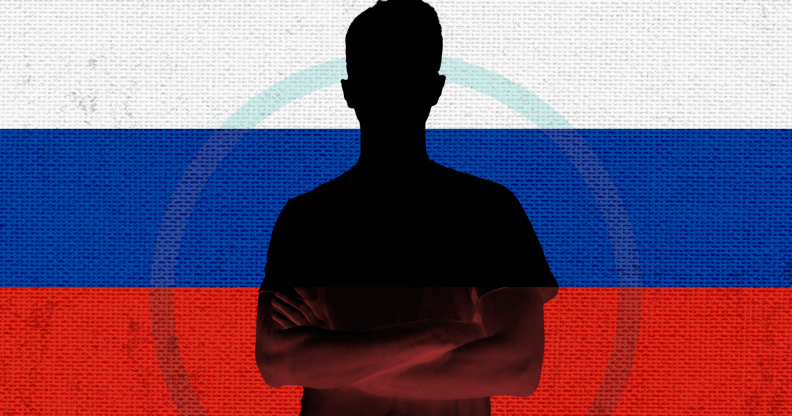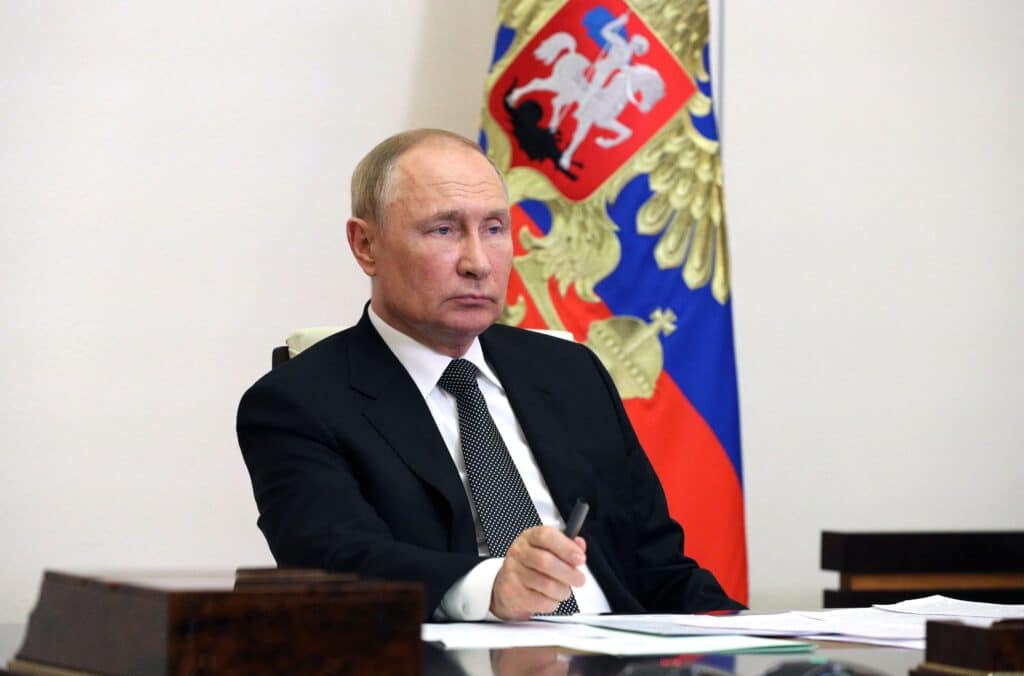Thousands call on Russia to ban barbaric conversion therapy: ‘If we don’t, it will lead to death’

Russian LGBTQ+ people are enduring horrific conversion therapy. (Envato/PinkNews)
Russian activists are rallying to ban conversion therapy in the country, with one survivor saying not doing so will lead to “death”.
Coming Out, an LGBTQ+ advocacy group forced to flee Russia following the invasion of Ukraine, has launched a petition to put a stop to the untold number of clinics and so-called “specialists” claiming they can change a person’s sexual orientation, gender identity or gender expression.
“They use hormonal drugs, hypnosis, occupational therapy, electric shock torture, mutilating surgery, and even ‘corrective’ rape,” the All Out petition states.
The petition, which so far has more than 4,300 signatures of its 5,000 target, calls on president Vladimir Putin, prime minister Mikhail Mishustin as well as the country’s top lawmaker, health and human rights officials and diplomats to legislate a ban.
“We, LGBTQ-initiative group Coming Out, want Russia to also ban torture of queer people. We demand a ban on conversion therapy and criminalisation of compulsory treatment and advertising of such services, as well as the introduction of penalties – a fine and/or imprisonment,” the petition adds.
Conservation therapy is a discredited practice that some of the world’s largest medical associations and the United Nations consider torture.
In the past, the practice has included severe methods like electroshock treatments, institutionalisation, mutilating operations and counselling. Many of these methods, Coming Out says, are still going on today in Russia.
Suicide attempts triple for LGBTQ+ young people who report efforts both at and outside the home to change who they are, according to a 2018 study by The Family Acceptance Project. They are more likely to experience severe anxiety and depression and earn less than those who never experienced the practice.
With a culture of silence and the country’s “gay propaganda” law keeping LGBTQ+ people in the shadows, it can be impossible to know just how many Russians have been subjected to conversion therapy.
But among them is Pauline (not her real name), a 32-year-old bisexual intersex person who grew up in 1990s Vladivostok.
Her family forcibly tried to change her gender identity and expression, making her undergo painful operations and hormonal therapies as well as sending her to institutions to “convert” her,” she told PinkNews.
The child of a veterinarian and a military surgeon, Pauline suffered four “normalising operations” when she was a baby – all without her consent. Doctors told her parents that they could “eliminate the excess” so she could be raised as a “boy”.
Pauline spent her childhood in the dark about her being intersex. “I could not discuss anything related to why my body was like it was. Why did I have scars and was my body didn’t look like the others,” she said.

Russian LGBTQ+ advocates and a conversion therapy survivor are urging president Vladimir Putin to prohibit the practise. (MIKHAIL KLIMENTYEV/Sputnik/AFP via Getty Images)
Aged 13, Pauline noticed “small bumps” forming on her chest – breasts. Pauline’s parents acted fast: “Doctors prescribed what they called ‘vitamin’ injections. Once every three weeks, I had to endure a painful injection,” she said.
Pauline came to realise the “vitamins” were testosterone shots. These made her taller, her voice deeper and begin to grow facial hair.
Many surgeries on intersex youth, which include intersex genital mutilations, can lead to drastic health problems and trauma down the line. “Because of the conversion therapy, I began to have serious problems with the health of my internal organs,” Pauline said.
When she began feeling pain in her lower abdomen as a teen, Pauline went through a six-hour hysterectomy. But medical professionals and her parents told her she had appendicitis, not that her uterus was removed.
The operation left her feeling suicidal. “When I found out about what was removed from me, I wanted to do what I thought a lot about before,” she said. “I just stood on the edge and there was one step left, but I could not leave my family.
“What was done to me in childhood broke me as a person. At the moment I do not understand why I live, how to be,” she added.
One operation continues to haunt Pauline. “I am lying on the operating table. A doctor walks by, I’m very scared. I cry, but they put a mask on my face and I fall asleep very quickly. When I wake up, I feel like I’ve been deprived of something. It’s too painful for me,” she recalled.
Her parents told her for years that it was nothing more than a “bad dream”.
To ensure Pauline was a “boy”, whenever she questioned her gender or did anything “girly”, her parents would scold her or institutionalise her.
“I was sent several times to some institution, which my parents called a ‘special sanatorium’,” Pauline said, adding that her parents paid large amounts of money to do so. “In this institution, I was forced to live a strict daily routine. As far as I remember, there were only boys there.
“Any manifestation of emotions was punished with slaps in the face and punishment, in the form of standing on the nightstand without moving (for any movement – beatings), beatings for disobedience and failure to comply with commands, running around the stadium without clothes.
“Every time I behaved differently than my parents saw fit, I was reminded that they could send me there again, and for a long time.”
Pauline realised she was intersex only a few years ago when she spoke to doctors about why she had breasts despite being told she is “male” – the realisation shocked her.
“The result is the same – I am intersex. Who is this, why is this with me? These were constant questions, and the most important one is who am I?” she said.
“These revelations just destroyed me. I had one thought: I want to die. I am constantly very hurt and sad that my life was changed, that they took away from me who I was born to be.”
“But gradually with the help of specialists, I came to the point that I began to like my body,” she added, “I finally feel comfortable wearing the clothes that I have always liked.
“I just imagine some kind of harmony with myself. But there is still a lot to be restored. After all, I just want to be happy, to live in comfort. I want to have goals and dreams again and I want my hobbies have brought joy. Just to live and not be afraid.”
If Russia were to ban conversion therapy, it would place the nation in the company of Greece, Canada, France and more than a dozen others.
Pauline admits it’s a hundred-to-one shot, but not doing anything to ban conversion therapy in Russia at all is far more dangerous.
“If we do not prohibit such therapies, operations and any intervention that is aimed at changing a person,” Pauline said, “then this will only lead to broken destinies, crippled lives, and, worst of all, to death.”

